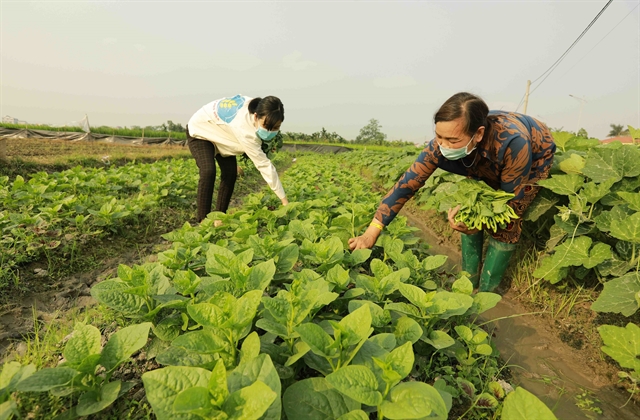.jpg) Society
Society
.jpg)
Minister of Agriculture and Rural Development Lê Minh Hoan addressed legislators’ concerns on social resources, supply chain recovery, input materials, consumption, and technology application in agriculture yesterday morning.

|
| A pilot farming model that follows Vietnamese Good Agricultural Practices (VietGAP) in Vĩnh Phúc Province. — VNA/VNS Photo Vũ Sinh |
HÀ NỘI — Minister of Agriculture and Rural Development Lê Minh Hoan addressed legislators’ concerns on social resources, supply chain recovery, input materials, consumption, and technology application in agriculture yesterday morning.
Continuing Tuesday's question-and-answer session, Minister Hoan said in response to a question by NA delegate Bế Trung Anh that social resources, building trust and creating linkages in the new agricultural market are an invisible yet important part of agricultural development.
In regard to the prices and markets of input materials, the Ministry of Agriculture and Rural Development (MARD) has been working with the Ministry of Industry and Trade (MoIT) to better manage the market, and coordinate systems and associations to reduce price increases.
Minister Hoan said: “Change is difficult. We put too much consideration into the cost of change, and not enough into the cost of not changing.
“The inevitable trend is to shift from conventional production to green, ecological and environment-friendly production. Change is a must.”
In the future, the MARD will continue to research and propose policies to support and encourage businesses to invest in organic production. The ministry will also look into agricultural processes that could reduce inputs and use alternative materials.
Responding to questions about the consumption of agricultural products, Hoan said that prices fluctuate in the domestic market due to the substantial dependence on exports, especially in the Southern provinces.
Production and consumption activities have resumed after the pandemic, but they are not yet effective, he added.
A large number of businesses and cooperatives in the value chain still have limited capacity in terms of capital, skills, and market share. Therefore, they have difficulty joining and securing a place on modern market channels and e-commerce platforms said the minister.
The MARD is working step by step to remove technical barriers and open up official export markets, in order to bring more Vietnamese produce into major and potential markets.
According to NA delegate Nguyễn Quang Huân, during the 2016-20 period, the State budget allocated more than VNĐ350 billion (US$15.1 million) for aquaculture and agriculture biotechnology programmes, of which more than VNĐ349 billion are for research projects of new-style rural area, and more than VNĐ99 billion ($4.3 million) for the application of advanced technology.
Huân asked for the minister’s evaluation of the effectiveness of implementing these budgets, and the future plans for 2022-23 to utilise the results of the aforementioned programmes.
Answering this question, Minister Hoan said that science-technology and digital transformation are the keys to agricultural innovation. The MARD has also been finding ways to implement new-style rural area programmes and technology applications in agriculture, as well as calling for the socialisation of research projects that can bring about practical results.
Following the session, Deputy Prime Minister (PM) Lê Văn Thành reported that during the first five months of 2022, agricultural export value has reached $23.2 billion, equivalent to an increase of 16.8 per cent.
However, the reality is that Việt Nam’s export produce still encounters multiple challenges, especially in major markets with high quality requirements.
One of the main reasons is the small number of concentrated, large-scale production areas with advanced technology that are able to meet the markets’ standards. There are still multiple low-quality products due to scattered and spontaneous agricultural production.
Proposing solutions for agricultural development, Deputy PM Thành said that the Government will focus on renovating production, from the investment process and variety selection to developing standardised raw material areas into large-scale agricultural production locations.
It is also necessary to strengthen trade promotion and negotiation to obtain official export quotas to major markets, and to provide credit support and tax exemption to attract investments in farming materials, fertilisers, and the processing industry.
The Deputy PM also proposed reviewing and assessing the demand for raw materials and food processing for livestock, which will then be used to develop production areas for the animal feed industry.
The Government will put the focus on giving direction and compiling proposals to amend the Law on Land, building frameworks and policies to take advantage of land resources, creating favourable conditions for farmers to effectively utilise the land for agricultural production, and accelerate the implementation process of the national target programme on new rural development.
Concluding the question-and-answer session with Minister Hoan, NA Chairman Vương Đình Huệ emphasised that agriculture and farmers have always been a strategic factor. It also forms an important foundation for sustainable socio-economic development, political stability, social safety and order, and national defence and security.
The NA chairman also saw that the session was a dynamic discussion that stayed focused on the key points, with high objectivity and constructiveness. — VNS
.jpg)



